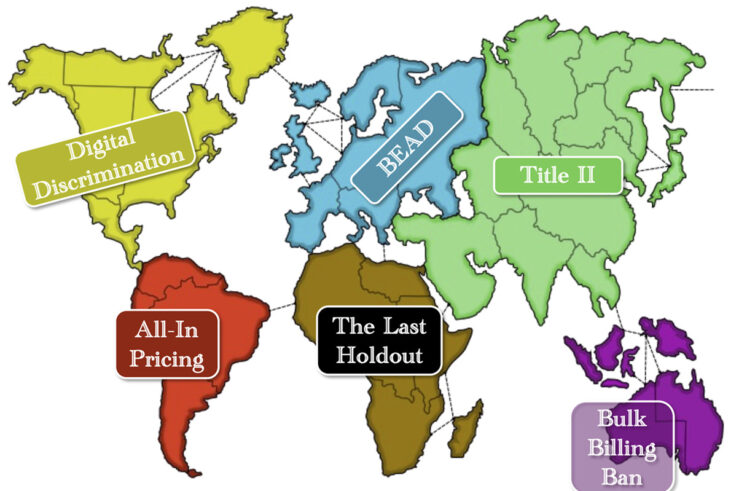Showing results for: “digital markets act”
It’s Risk, Jerry, The Game of Broadband Conquest
The big news in telecommunications policy last week wasn’t really news at all—the Federal Communications Commission (FCC) released its proposed rules to classify broadband internet under Title II of the Communications Act. Supporters frame the proposed rules as “net neutrality,” but those provisions—a ban on blocking, throttling, or engaging in paid or affiliated-prioritization arrangements—actually comprise ... It’s Risk, Jerry, The Game of Broadband Conquest
Any Way You Measure It, Warren Is Wrong to Claim “Facebook and Google Account for 70% of All Internet Traffic”
When she rolled out her plan to break up Big Tech, Elizabeth Warren paid for ads (like the one shown above) claiming that “Facebook and Google account for 70% of all internet traffic.” This statistic has since been repeated in various forms by Rolling Stone, Vox, National Review, and Washingtonian. In my last post, I ... Any Way You Measure It, Warren Is Wrong to Claim “Facebook and Google Account for 70% of All Internet Traffic”
Gans on Apple and Antitrust
Joshua Gans has an interesting post examining potential antitrust issues involving Apple, an issue we’ve discussed here and here. Gans focuses in on the two most relevant issues: There are two aspects that might raise antitrust concern: (i) Apple’s exclusivity-like requirement that no external payment links be permitted in apps and (ii) Apple’s most-favored customer ... Gans on Apple and Antitrust
U.S. Antitrust Enforcers Should Reject AI Interventionism
The U.S. Justice Department (DOJ) and Federal Trade Commission (FTC), in tandem with their fellow competition-law enforcers from Europe (the European Commission) and the United Kingdom (the Competition and Markets Authority, or CMA), issued a joint statement July 23 titled “Joint Statement on Competition in Generative AI Foundation Models and AI Products.” This joint statement ... U.S. Antitrust Enforcers Should Reject AI Interventionism
Europe’s Latest Antitrust Policy Pronouncement Threatens Innovation
A newly released draft of the European Union’s proposed monopolization guidelines suggest they could pose a new threat to innovative business practices that promote high-tech economic growth. The EU should scrap the draft and U.S. antitrust enforcers should likewise reject its approach. Overregulation Harms EU Economic Growth and Innovation The United States, not Europe, has ... Europe’s Latest Antitrust Policy Pronouncement Threatens Innovation
Why Competition Enforcers’ Annual Roundtable Should Focus on Competition Advocacy and Combating Anticompetitive Market Distortions
Spring is here, and hope springs eternal in the human breast that competition enforcers will focus on welfare-enhancing initiatives, rather than on welfare-reducing interventionism that fails the consumer welfare standard. Fortuitously, on March 27, the Federal Trade Commission (FTC) and U.S. Justice Department (DOJ) are hosting an international antitrust-enforcement summit, featuring senior state and foreign ... Why Competition Enforcers’ Annual Roundtable Should Focus on Competition Advocacy and Combating Anticompetitive Market Distortions
10 Years After SOPA/PIPA, Congress Still Needs to Address Online Piracy
Activists who railed against the Stop Online Piracy Act (SOPA) and the PROTECT IP Act (PIPA) a decade ago today celebrate the 10th anniversary of their day of protest, which they credit with sending the bills down to defeat. Much of the anti-SOPA/PIPA campaign was based on a gauzy notion of “realizing [the] democratizing potential” ... 10 Years After SOPA/PIPA, Congress Still Needs to Address Online Piracy
A Regulatory Failure of Imagination
Underpinning many policy disputes is a frequently rehearsed conflict of visions: Should we experiment with policies that are likely to lead to superior, but unknown, solutions, or should we should stick to well-worn policies, regardless of how poorly they fit current circumstances? This conflict is clearly visible in the debate over whether DOJ should continue ... A Regulatory Failure of Imagination
Rising Concentration: Drifters Followup Is Worse Than the Original
Germán Gutiérrez and Thomas Philippon have released a major rewrite of their paper comparing the U.S. and EU competitive environments. Although the NBER website provides an enticing title — “How European Markets Became Free: A Study of Institutional Drift” — the paper itself has a much more yawn-inducing title: “How EU Markets Became More Competitive ... Rising Concentration: Drifters Followup Is Worse Than the Original
The Proposed Merger Guidelines: How Much of a Shift?
The proposed Horizontal Merger Guidelines (HMGs) have been treated by some as a major shift in enforcement approach away from a tight structure that begins with market definition to a more flexible and open-ended competitive effects approach. Some of the specific concerns that have been raised are that the proposed HMGs dramatically change enforcement policy ... The Proposed Merger Guidelines: How Much of a Shift?
Paternalism and the iPod, Part Trois
The WSJ Law Blog reports (via this AP Report) that the French law allowing regulators to force Apple to make its iPod compatible with rival offerings went into effect Thursday. “Me too” regulatory movements are already underway in Britain, Norway, Sweden, Poland and Denmark. This, as Microsoft plans to introduce “Zune,” its entry into the ... Paternalism and the iPod, Part Trois
What We Know About the Rise in Markups
In my research and newsletters, I’ve written about how to interpret markups—mostly on the theory side. I haven’t devoted much space explaining the empirics. How high are markups in the United States? Are they rising? If so, by how much? This post seeks to answer those questions. I’m writing it after reading a new paper ... What We Know About the Rise in Markups











